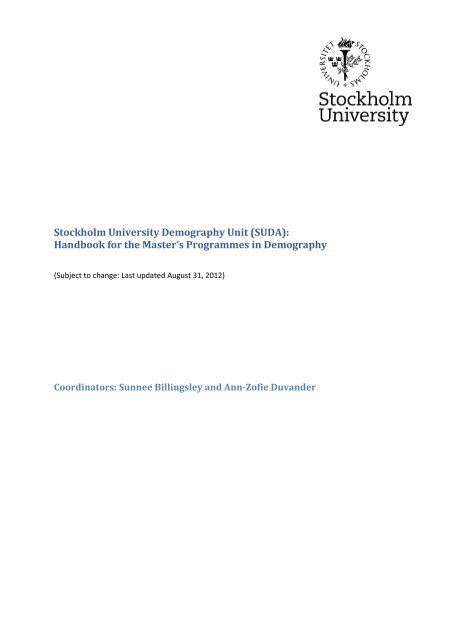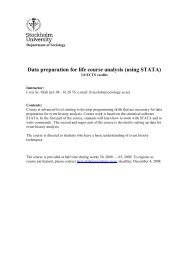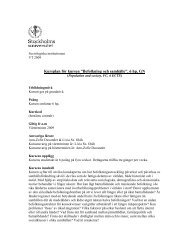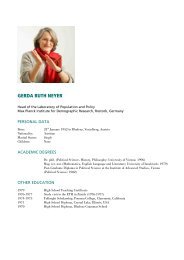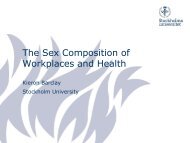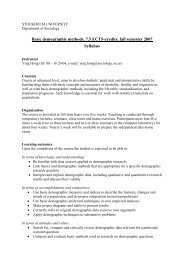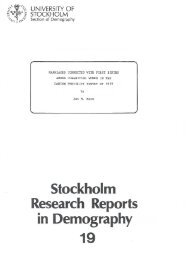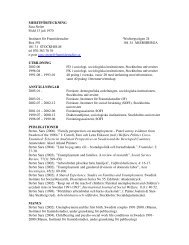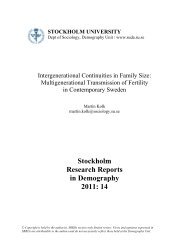Handbook for the Master's Programmes in Demography - SUDA
Handbook for the Master's Programmes in Demography - SUDA
Handbook for the Master's Programmes in Demography - SUDA
Create successful ePaper yourself
Turn your PDF publications into a flip-book with our unique Google optimized e-Paper software.
Stockholm University <strong>Demography</strong> Unit (<strong>SUDA</strong>):<br />
<strong>Handbook</strong> <strong>for</strong> <strong>the</strong> Master’s <strong>Programmes</strong> <strong>in</strong> <strong>Demography</strong><br />
(Subject to change: Last updated August 31, 2012)<br />
Coord<strong>in</strong>ators: Sunnee Bill<strong>in</strong>gsley and Ann-Zofie Duvander
Contents<br />
Stockholm University <strong>Demography</strong> Unit (<strong>SUDA</strong>): <strong>Handbook</strong> <strong>for</strong> <strong>the</strong> Master’s <strong>Programmes</strong> <strong>in</strong><br />
<strong>Demography</strong> .......................................................................................................................................1<br />
Contents ............................................................................................................................................2<br />
1. Multidiscipl<strong>in</strong>ary Master’s Programme <strong>in</strong> <strong>Demography</strong> (2-year, 120 credits) ...................................3<br />
2. Master’s Programme <strong>in</strong> <strong>Demography</strong> (1-year, 60 credits) ................................................................4<br />
3. Course application and registration .................................................................................................6<br />
4. Master’s Theses ..............................................................................................................................6<br />
5. Course Schedule .............................................................................................................................7<br />
6. Contact persons at o<strong>the</strong>r departments .......................................................................................... 10<br />
7. Miscellaneous and important! ...................................................................................................... 11<br />
8. To Write a Master’s Thesis <strong>in</strong> <strong>Demography</strong> at Stockholm University ............................................. 12<br />
Appendix 1. Course descriptions ...................................................................................................... 15<br />
Appendix 2. Rules and policies at Stockholm University .................................................................... 23
1. Multidiscipl<strong>in</strong>ary Master’s Programme <strong>in</strong> <strong>Demography</strong><br />
2-year, 120 credits<br />
(Mångvetenskapligt masterprogram i demografi)<br />
Below we provide a short description of <strong>the</strong> structure of <strong>the</strong> two-year Master’s Programme hosted<br />
by <strong>the</strong> Department of Sociology. O<strong>the</strong>r participat<strong>in</strong>g departments are (<strong>in</strong> alphabetical order):<br />
Economic History, Economics, Human Geography, and Statistics. In addition, Master’s students are<br />
eligible to apply <strong>for</strong> courses at CHESS (<strong>the</strong> Centre <strong>for</strong> Health Equity Studies).<br />
The two-year program consists of 120 ECTS credits <strong>in</strong> total, comprised of core courses, elective<br />
courses and <strong>in</strong>dependent research. The core courses are given <strong>in</strong> <strong>the</strong> Multidiscipl<strong>in</strong>ary <strong>Master's</strong><br />
Programme <strong>in</strong> <strong>Demography</strong> and are compulsory <strong>for</strong> all students (Population Development and Social<br />
Change, Basic Demographic Methods, Population Processes, Research Methods, and Advanced<br />
Demographic Methods I). These courses make up about one-third of <strong>the</strong> programme, 37.5 ECTS<br />
credits, with two of <strong>the</strong> five courses focus<strong>in</strong>g on demographic methods and one course focus<strong>in</strong>g on<br />
<strong>the</strong> preparation of a short master’s <strong>the</strong>sis proposal to be submitted at <strong>the</strong> end of <strong>the</strong> second<br />
semester.<br />
Elective courses comprise 52.5 ECTS credits. Of <strong>the</strong>se elective courses, 37.5 ECTS credits must be<br />
received from courses that have a clear demographic component and are offered by <strong>the</strong><br />
departments that participate <strong>in</strong> <strong>the</strong> Multidiscipl<strong>in</strong>ary <strong>Master's</strong> Programme <strong>in</strong> <strong>Demography</strong> or CHESS.<br />
The rema<strong>in</strong><strong>in</strong>g course work consists of 15 ECTS credits that can be taken <strong>in</strong> o<strong>the</strong>r elective courses<br />
offered by participat<strong>in</strong>g departments and CHESS. In total, at least 30 credits of <strong>the</strong> Master’s<br />
Programme are to be taken <strong>in</strong> research methods and analytical techniques.<br />
In l<strong>in</strong>e with <strong>the</strong> multidiscipl<strong>in</strong>ary nature of our program, we encourage students to take courses <strong>in</strong><br />
<strong>the</strong> affiliated departments. Students may choose to complete a <strong>Demography</strong> Master’s <strong>the</strong>sis with a<br />
focus on one of <strong>the</strong>se discipl<strong>in</strong>es and receive specialized supervision accord<strong>in</strong>gly. Courses <strong>in</strong>cluded <strong>in</strong><br />
<strong>the</strong> Master’s degree should be at an advanced level, but a maximum of 15 ECTS on <strong>the</strong> basic level will<br />
be accepted. Table 1 syn<strong>the</strong>sizes <strong>in</strong><strong>for</strong>mation on <strong>the</strong> programme requirements and lists <strong>the</strong> courses<br />
that are part of <strong>the</strong> programme or that we recommend.<br />
It is also possible to do an <strong>in</strong>ternship, which counts as one course (7.5 or 15 credits) <strong>in</strong> <strong>the</strong> Master’s<br />
programme (see Appendix 1, Course Descriptions).<br />
The rema<strong>in</strong><strong>in</strong>g 30 ECTS credits are acquired dur<strong>in</strong>g one semester of <strong>in</strong>dependent full-time study to<br />
complete <strong>the</strong> Master’s <strong>the</strong>sis.<br />
Please note that required and elective courses are usually offered only once per year and sometimes<br />
less often (see also section 5 below). Students are encouraged to start plann<strong>in</strong>g <strong>the</strong>ir own personal<br />
comb<strong>in</strong>ation of courses as soon as possible. Questions about course plann<strong>in</strong>g should be discussed<br />
with <strong>the</strong> Master’s Programme Coord<strong>in</strong>ators.
2. Master’s Programme <strong>in</strong> <strong>Demography</strong><br />
1-year, 60 credits<br />
(Magisterprogram i demografi)<br />
The one-year Multidiscipl<strong>in</strong>ary Master’s Programme <strong>in</strong> <strong>Demography</strong> is also hosted by <strong>the</strong><br />
Department of Sociology. O<strong>the</strong>r participat<strong>in</strong>g departments are (<strong>in</strong> alphabetical order): Economic<br />
History, Economics, Human Geography, and Statistics. In addition, Master’s students are eligible to<br />
apply <strong>for</strong> courses at CHESS (<strong>the</strong> Centre <strong>for</strong> Health Equity Studies).<br />
This programme consists of a 15-credit <strong>the</strong>sis and a total of 45 ECTS credits <strong>in</strong> course work. The first<br />
three core courses listed <strong>in</strong> Table 1 are compulsory <strong>for</strong> all students (Population Development and<br />
Social Change, Basic Demographic Methods, and Population Processes). In addition, 22.5 ECTS credits<br />
are taken <strong>in</strong> elective courses, offered by any of <strong>the</strong> participat<strong>in</strong>g departments and CHESS. Of <strong>the</strong>se<br />
elective credits, 15 must have a demographic component (listed <strong>in</strong> <strong>the</strong> second section of Table 1) and<br />
7.5 can be taken <strong>in</strong> a course without a demographic component (listed <strong>in</strong> <strong>the</strong> bottom section of Table<br />
1). All courses <strong>in</strong>cluded <strong>in</strong> this Master’s degree must be on an advanced level.<br />
Please note that required and elective courses are usually offered only once per year and sometimes<br />
less often (see also section 5 below). Students are encouraged to start plann<strong>in</strong>g <strong>the</strong>ir own personal<br />
comb<strong>in</strong>ation of courses as soon as possible. Questions about course plann<strong>in</strong>g should be discussed<br />
with <strong>the</strong> Master’s Programme Coord<strong>in</strong>ators.
Table 1. Course distribution and list<strong>in</strong>g <strong>for</strong> <strong>the</strong> 1 and 2-year Master’s <strong>Programmes</strong><br />
Program<br />
requirement<br />
Core courses<br />
2-year Master’s:<br />
all 5 courses<br />
1-year Master’s:<br />
first 3 courses<br />
Course name Host department ECTS<br />
credits<br />
Population development and social change Sociology 7.5<br />
Basic demographic methods Sociology 7.5<br />
Population processes Sociology 7.5<br />
Research methods (Master’s <strong>the</strong>sis proposal course) Sociology 7.5<br />
Advanced demographic methods Sociology 7.5<br />
Elective courses<br />
with a<br />
demographic<br />
component<br />
2-year Master’s:<br />
37.5 ECTS credits<br />
1-year Master’s:<br />
15 ECTS credits<br />
Family sociology Sociology 7.5<br />
Introduction to quantitative data and statistics Sociology 7.5<br />
Advanced demographic methods 2: Fur<strong>the</strong>r topics and Sociology 7.5<br />
an empirical project <strong>in</strong> event-history analysis<br />
Family dynamics <strong>in</strong> a chang<strong>in</strong>g Europe Sociology 7.5<br />
Migration and economic growth: Sweden and <strong>the</strong> Economic History 7.5<br />
world, 1800-2000<br />
Migration and social change – a life course perspective Human Geography 15<br />
Analysis of survival data with demographic applications Statistics 7.5<br />
Elective courses* Welfare states <strong>in</strong> a chang<strong>in</strong>g Europe Sociology 7.5<br />
Quantitative methods <strong>in</strong> <strong>the</strong> social sciences Sociology 7.5<br />
2-year Master’s: Do<strong>in</strong>g gender: mapp<strong>in</strong>g transitions <strong>in</strong> <strong>in</strong>stitutions, Sociology 7.5<br />
15 ECTS credits policies and practices<br />
Social Stratification Sociology 7.5<br />
1-year Master’s:<br />
Modern Sociological Theory Sociology 7.5<br />
7.5 ECTS credits The Swedish Model Economics 7.5<br />
Intermediate development economics Economics 7.5<br />
Urbanization and environment Human Geography 15<br />
Fem<strong>in</strong>ist Theories and <strong>the</strong> Gendered Global Division of Economic History 15<br />
Labor<br />
BRIC <strong>in</strong> <strong>the</strong> Global Economy: Development and<br />
Economic History 15<br />
Strategies of Brazil, Russia, India and Ch<strong>in</strong>a<br />
Globalization, environment and social change Economic History 15<br />
*This is not a complete list. Please see courses offered at <strong>the</strong> participat<strong>in</strong>g departments and CHESS.
3. Course application and registration<br />
Course application/enrolment and course registration are two separate processes. Application/<br />
enrolment requests a seat <strong>in</strong> a course, whereas registration confirms that <strong>the</strong> student will attend <strong>the</strong><br />
course. To be admitted to a course, you need to apply by <strong>the</strong> deadl<strong>in</strong>e. Dates <strong>for</strong> applications are<br />
found at <strong>the</strong> respective departments’ websites. After be<strong>in</strong>g accepted <strong>in</strong>to a course, students need to<br />
confirm participation by register<strong>in</strong>g. Until registered, students are not guaranteed a place <strong>in</strong> <strong>the</strong><br />
course. If apply<strong>in</strong>g <strong>for</strong> a course <strong>in</strong> a participat<strong>in</strong>g department (not Sociology), it may be a good idea to<br />
apply <strong>for</strong> alternative courses you would like to take <strong>in</strong> case you are not admitted. Applications can be<br />
made centrally or locally at <strong>in</strong>dividual departments, registration <strong>in</strong> courses takes place at <strong>the</strong><br />
<strong>in</strong>dividual department. See below!<br />
Course applications<br />
All students registered <strong>in</strong> <strong>the</strong> Master’s <strong>Programmes</strong> are guaranteed admission to all core courses and<br />
are automatically enrolled <strong>in</strong> <strong>the</strong> first three core courses <strong>in</strong> <strong>the</strong> first fall term (Population<br />
Development and Social Change, Basic Demographic Methods, Population Processes). Registration<br />
<strong>for</strong> <strong>the</strong> last course <strong>in</strong> <strong>the</strong> fall semester (period 4) can be done <strong>in</strong> <strong>the</strong> beg<strong>in</strong>n<strong>in</strong>g of <strong>the</strong> fall semester.<br />
Students <strong>in</strong> <strong>the</strong> Master’s <strong>Programmes</strong> must apply <strong>in</strong>dividually <strong>for</strong> <strong>the</strong> additional courses <strong>the</strong>y<br />
choose, regardless of <strong>the</strong> department <strong>in</strong> which <strong>the</strong> courses are offered, <strong>in</strong>clud<strong>in</strong>g <strong>the</strong> Department<br />
of Sociology.<br />
The application deadl<strong>in</strong>e <strong>for</strong> courses offered <strong>in</strong> <strong>the</strong> spr<strong>in</strong>g semester 2013 is October 15. Please use<br />
<strong>the</strong> studera.nu website to apply. Un<strong>for</strong>tunately, <strong>in</strong><strong>for</strong>mation is miss<strong>in</strong>g on <strong>the</strong> English site; if you need<br />
assistance, applications can be made <strong>in</strong>ternally at <strong>the</strong> respective department’s student office (<strong>for</strong><br />
example, contact Maria Bagger-Sjöbäck <strong>for</strong> courses offered by <strong>the</strong> Department of Sociology: B908, e-<br />
mail maria.bagger-sjoback@sociology.su.se, phone 08-16 20 28). The application deadl<strong>in</strong>e <strong>for</strong><br />
courses offered <strong>in</strong> <strong>the</strong> fall semester 2013 is April 15.<br />
Course registration<br />
All students must register <strong>for</strong> every course to which <strong>the</strong>y are admitted, <strong>in</strong>clud<strong>in</strong>g core courses.<br />
Registration must be done by each <strong>in</strong>dividual student, <strong>for</strong> both <strong>the</strong> first semester and <strong>the</strong> rema<strong>in</strong><strong>in</strong>g<br />
semesters. The consequence of not register<strong>in</strong>g might be that you are excluded from <strong>the</strong> course.<br />
Please consult each <strong>in</strong>dividual department <strong>for</strong> <strong>in</strong><strong>for</strong>mation regard<strong>in</strong>g registration (see<br />
http://www.su.se <strong>for</strong> web pages).<br />
4. Master’s Theses<br />
Students should start th<strong>in</strong>k<strong>in</strong>g about a possible <strong>the</strong>sis topic and advisor as early as <strong>the</strong> first semester.<br />
A start-up meet<strong>in</strong>g with potential supervisors will be held early dur<strong>in</strong>g <strong>the</strong> first fall semester. A website<br />
(called “Mondo”) with <strong>in</strong><strong>for</strong>mation on suggested topics, available data, previous <strong>the</strong>ses, etc. will<br />
be available from <strong>the</strong> start of <strong>the</strong> first fall semester. In January-February of <strong>the</strong> first spr<strong>in</strong>g semester,<br />
an <strong>in</strong>troductory sem<strong>in</strong>ar will be held to help students ref<strong>in</strong>e <strong>the</strong>ir <strong>the</strong>sis ideas. Preparatory work <strong>for</strong><br />
<strong>the</strong> <strong>the</strong>sis beg<strong>in</strong>s <strong>in</strong> <strong>the</strong> latter half of <strong>the</strong> first spr<strong>in</strong>g semester with <strong>the</strong> Research Methods – Master’s<br />
<strong>the</strong>sis proposal course.
5. Course Schedule<br />
Below you will f<strong>in</strong>d <strong>in</strong><strong>for</strong>mation on courses and when <strong>the</strong>y are offered. Each <strong>in</strong>dividual student will –<br />
<strong>in</strong>dependently or <strong>in</strong> collaboration with <strong>the</strong> coord<strong>in</strong>ator and/or student counselor – choose <strong>the</strong><br />
courses that will allow <strong>the</strong>m to complete <strong>the</strong> program. As outl<strong>in</strong>ed above, certa<strong>in</strong> courses are core<br />
courses and thus compulsory. Students are encouraged to beg<strong>in</strong> mak<strong>in</strong>g <strong>the</strong>ir own personalized<br />
course plan as soon as possible. Please note aga<strong>in</strong> that courses are usually offered only once each<br />
year (and sometimes less often). Moreover, some courses of <strong>in</strong>terest may be offered at <strong>the</strong> same<br />
time. A full-time course load consists of 7,5 ECTS credits per period, which means a 7,5 credit course<br />
scheduled to last only one period is a full-time course and a 7,5 credit course scheduled over two<br />
periods is a half-time course. Students should consult with <strong>the</strong> coord<strong>in</strong>ator and/or student counselor<br />
be<strong>for</strong>e enroll<strong>in</strong>g <strong>for</strong> more than a full-time course load. The tables below provide an overview of <strong>the</strong><br />
ma<strong>in</strong> courses offered with<strong>in</strong> <strong>the</strong> Master’s programmes by semester, study period, and department.<br />
O<strong>the</strong>r courses may be available, however, and we encourage students to search <strong>for</strong> courses that are<br />
suitable to <strong>the</strong>ir specific research <strong>in</strong>terests. Courses not listed here must be approved by <strong>the</strong><br />
Master’s Programme coord<strong>in</strong>ators be<strong>for</strong>e apply<strong>in</strong>g and register<strong>in</strong>g.<br />
Please note that <strong>the</strong> range of courses is subject to change. Keep yourself updated via studera.nu<br />
First fall term<br />
Core courses<br />
Dep. of Sociology<br />
Dep. of Economic<br />
History<br />
Period 1 Period 2 Period 3 Period 4<br />
Population Basic<br />
Population<br />
development and demographic processes<br />
social change methods<br />
(7,5 ECTS credits)<br />
(7,5 ECTS credits) (7,5 ECTS credits)<br />
Introduction to<br />
quantitative data<br />
and statistics<br />
(7,5 ECTS credits)<br />
Fem<strong>in</strong>ist Theories and <strong>the</strong> Gendered<br />
Global Division of Labor<br />
(15 ECTS credits)
First spr<strong>in</strong>g term<br />
Period 1 Period 2 Period 3 Period 4<br />
Core courses<br />
Research methods (Master’s <strong>the</strong>sis<br />
proposal course)<br />
(7,5 ECTS credits, half time)<br />
Dep. of Sociology Modern sociological <strong>the</strong>ory<br />
(7,5 ECTS credits, half time)<br />
Family sociology<br />
(7,5 ECTS credits, half time)<br />
Quantitative methods <strong>in</strong> <strong>the</strong> social<br />
sciences<br />
(7,5 ECTS credits, half time)<br />
Welfare states <strong>in</strong><br />
a chang<strong>in</strong>g<br />
Europe<br />
(7,5 ECTS credits)<br />
Dep. of<br />
Economics<br />
The Swedish model<br />
(7,5 ECTS credits, half time)<br />
Dep. of Economic<br />
History<br />
Migration and<br />
economic<br />
growth: Sweden<br />
and <strong>the</strong> world,<br />
1800-2000<br />
(7,5 ECTS credits)<br />
BRIC <strong>in</strong> <strong>the</strong> Global Economy:<br />
Development and Strategies of Brazil,<br />
Russia, India and Ch<strong>in</strong>a<br />
(15 ECTS credits)<br />
Dep. of Human<br />
Geography<br />
Dep. of Statistics<br />
Urbanization and environment<br />
(15 ECTS credits)<br />
Migration and social change – a life<br />
course perspective<br />
(15 ECTS credits)<br />
Analysis of<br />
survival data<br />
with<br />
demographic<br />
applications<br />
(7,5 ECTS credits)
Second fall term<br />
Period 1 Period 2 Period 3 Period 4<br />
Core courses Advanced demographic methods 1:<br />
an <strong>in</strong>troduction to event-history<br />
analysis<br />
(7,5 ECTS credits, half time)<br />
Dep. of Sociology Family Dynamics<br />
<strong>in</strong> a Chang<strong>in</strong>g<br />
Europe<br />
(7,5 ECTS credits)<br />
Dep. of<br />
Economics<br />
Dep. of Economic<br />
History<br />
Dep. of Human<br />
Geography<br />
Social<br />
Stratification<br />
(7,5 ECTS credits)<br />
Intermediate development<br />
economics<br />
(7,5 ECTS credits, half time)<br />
Globalization, environment and social<br />
change<br />
(15 ECTS credits)<br />
Do<strong>in</strong>g gender:<br />
mapp<strong>in</strong>g<br />
transitions <strong>in</strong><br />
<strong>in</strong>stitutions,<br />
policies and<br />
practices<br />
(7,5 ECTS credits)<br />
Advanced<br />
demographic<br />
methods 2:<br />
Fur<strong>the</strong>r topics<br />
and an empirical<br />
project <strong>in</strong> eventhistory<br />
analysis<br />
(7,5 ECTS credits)<br />
Introduction to<br />
quantitative data<br />
and statistics<br />
(7,5 ECTS credits)<br />
Migration and<br />
social change – a<br />
life course<br />
perspective<br />
(15 ECTS credits)<br />
Second spr<strong>in</strong>g term<br />
Period 1 Period 2 Period 3 Period 4<br />
Thesis (30 ECTS credits)
6. Contact persons at o<strong>the</strong>r departments<br />
Economic history<br />
http://www.ekohist.su.se/pub/jsp/polopoly.jspd=10042<br />
Johanna Andersson-Raeder (ma<strong>in</strong> student contact)<br />
Room A902<br />
Phone 08-16 3120<br />
E-mail johanna.andersson-raeder@ekohist.su.se<br />
Visit<strong>in</strong>g hours: Mondays 9-12 and 14-16<br />
Per Hild<strong>in</strong>g<br />
Room A9630<br />
Phone 08-16 47 52<br />
E-mail per.hild<strong>in</strong>g@ekohist.su.se<br />
Economics<br />
http://www.ne.su.se/english/education/economics-at-stockholm-university-1.21437<br />
Anders Fjellström (ma<strong>in</strong> student contact)<br />
Room A716<br />
Phone 08-16 4241<br />
E-mail anders.fjellstrom@ne.su.se<br />
Visit<strong>in</strong>g hours: Mondays-Thursday 12:30-13:30 and Tuesday 17-18:00<br />
Peter Langenius<br />
Room A718<br />
Phone 08-16 39 22<br />
E-mail lan@ne.su.se<br />
Human Geography<br />
http://www.humangeo.su.se/english/<br />
Veronica Hohl (ma<strong>in</strong> student contact)<br />
Room X331<br />
Phone 08-16 48 37<br />
E-mail veronica.hohl@humangeo.su.se<br />
Bo Malmberg<br />
Room X328<br />
Phone 08-16 48 53<br />
E-mail bo.malmberg@humangeo.su.se<br />
Visit<strong>in</strong>g hours: Accord<strong>in</strong>g to agreement
Statistics<br />
http://www.statistics.su.se/english/<br />
Pär Stockhammar (ma<strong>in</strong> student contact)<br />
Room B777<br />
Phone 08-16 29 81<br />
E-mail par.stockhammar@stat.su.se<br />
Visit<strong>in</strong>g hours: Monday & Thursday 12:30-14<br />
Gebrenegus Ghilagaber<br />
Room B718<br />
Phone 08-16 75 11<br />
E-mail Gebre@stat.su.se<br />
CHESS (Centre <strong>for</strong> Health Equity Studies)<br />
http://www.chess.su.se/<br />
Jenny Eklund<br />
Phone 08-674 79 70<br />
E-mail jenny.eklund@chess.su.se<br />
7. Miscellaneous and important!<br />
• Questions regard<strong>in</strong>g registration <strong>for</strong> courses, registration of grades <strong>in</strong> LADOK, transcripts etc.<br />
can be addressed to <strong>the</strong> students’ office: B980, e-mail studentexp@sociology.su.se, phone<br />
08-16 12 85. Telephone hours are: Tuesdays and Thursdays 9-12. Visit<strong>in</strong>g hours are: Tuesdays<br />
and Thursdays 9:15-12:15, and Tuesdays 14-16. For questions about course schedules please<br />
consult <strong>the</strong> responsible teacher!<br />
• The student counselor is Maria L<strong>in</strong>d. Her office is <strong>in</strong> B982. Telephone hours are Tuesdays 14-<br />
15 and Thursdays 9-11, and visit<strong>in</strong>g hours are Tuesdays 15-16 and Thursdays 11-12. All o<strong>the</strong>r<br />
appo<strong>in</strong>tments made by agreement.<br />
• Current coord<strong>in</strong>ators of <strong>the</strong> Master’s programmes are Sunnee Bill<strong>in</strong>gsley and Ann-Zofie<br />
Duvander. Sunnee offers visit<strong>in</strong>g hours <strong>in</strong> her office (B860) on Thursdays between 15 and<br />
16:00 or by appo<strong>in</strong>tment, which can be made through email<br />
sunnee.bill<strong>in</strong>gsley@sociology.su.se or phone 08-16 1762. Ann-Zofie’s email is<br />
ann-zofie.duvander@sociology.su.se and phone 08-16 32 12. Consult Sunnee if your question<br />
deals with course choices or equivalent academic questions. Regard<strong>in</strong>g academic matters<br />
you can also consult Maria Bagger-Sjöbäck (B908, e-mail maria.baggersjoback@sociology.su.se,<br />
phone 08-16 20 28) or <strong>the</strong> department’s student counselor.
• Please note that <strong>the</strong> range of courses is subject to change. Keep yourself updated via<br />
studera.nu and through contact with <strong>the</strong> department <strong>in</strong> question.<br />
• Almost all <strong>in</strong><strong>for</strong>mation on changes of dates, rooms etc. is communicated ei<strong>the</strong>r through e-<br />
mail or Mondo http://www.mondo.su.se . Check your e-mail (<strong>in</strong>clud<strong>in</strong>g your SU-account) and<br />
your Mondo-sites regularly, and make sure teachers and coord<strong>in</strong>ator have your correct e-<br />
mail address.<br />
• The fall semester of 2012 beg<strong>in</strong>s September 3, and ends January 16, 2012. The spr<strong>in</strong>g<br />
semester of 2013 beg<strong>in</strong>s January 21 and ends June 1. For <strong>the</strong> academic year 2013/2014 <strong>the</strong><br />
dates will be similar.<br />
• The syllabus <strong>for</strong> both Master’s programmes can be found on <strong>the</strong> Multidiscipl<strong>in</strong>ary Master’s Program <strong>in</strong><br />
<strong>Demography</strong> website.<br />
• Useful homepages are:<br />
http://www.suda.su.se (our own webpage!)<br />
http://www.sociology.su.se/ (Sociology Department webpage)<br />
http://www.su.se (here you can search <strong>for</strong> o<strong>the</strong>r participat<strong>in</strong>g departments)<br />
http://www.studera.nu (here you apply <strong>for</strong> courses)<br />
http://www.mitt.su.se (your SU-e-mailaccount etc)<br />
http://www.mondo.su.se (course material, submissions, etc)<br />
http://studenthalsanistockholm.se (students’ health services)<br />
8. To Write a Master’s or Magister Thesis <strong>in</strong> <strong>Demography</strong><br />
at Stockholm University<br />
Introduction<br />
The Master’s <strong>the</strong>sis completes your degree <strong>in</strong> <strong>Demography</strong>. Writ<strong>in</strong>g a <strong>the</strong>sis means that you will be<br />
able to specialize <strong>in</strong> an area that <strong>in</strong>terests you, that you will develop your skills <strong>in</strong> demographic<br />
<strong>the</strong>ory and methods, and that you will practice <strong>the</strong> art of academic writ<strong>in</strong>g. You will be able to write<br />
your <strong>the</strong>sis with<strong>in</strong> an area <strong>in</strong> which <strong>the</strong> sociology and demography faculty can offer qualified<br />
supervision.<br />
For 2-year Master’s students, <strong>the</strong> entire fourth semester is devoted to <strong>the</strong>sis writ<strong>in</strong>g (30 ECTS<br />
credits), while 1-year Master’s students write <strong>the</strong>ir <strong>the</strong>sis dur<strong>in</strong>g study periods three and four of <strong>the</strong><br />
second and last semester (15 ECTS credits). Preparation <strong>for</strong> <strong>the</strong> <strong>the</strong>sis should, however, beg<strong>in</strong> early <strong>in</strong><br />
<strong>the</strong> first semester. To prepare <strong>for</strong> <strong>the</strong> <strong>the</strong>sis, you will beg<strong>in</strong> consider<strong>in</strong>g possible <strong>the</strong>sis topics and<br />
establish contact with a supervisor early <strong>in</strong> <strong>the</strong> program. We will organize an <strong>in</strong><strong>for</strong>mal ga<strong>the</strong>r<strong>in</strong>g with<br />
students and potential supervisors mid-term dur<strong>in</strong>g <strong>the</strong> first semester. An <strong>in</strong>troductory sem<strong>in</strong>ar will<br />
be given early <strong>the</strong> second semester. At this po<strong>in</strong>t, students should have decided on a <strong>the</strong>sis topic <strong>in</strong><br />
consultation with <strong>the</strong> supervisor.<br />
Expectations <strong>for</strong> <strong>the</strong> 1-year and 2-year Master’s Thesis
1. Common features<br />
Both Master’s <strong>the</strong>ses must produce new scientific knowledge. They must demonstrate<br />
understand<strong>in</strong>g and application of appropriate <strong>the</strong>ory and method to a specific research question.<br />
And <strong>the</strong>y must draw conclusions about <strong>the</strong>oretical processes from empirical results. Theoretical<br />
arguments and <strong>in</strong>ferences should be made at <strong>the</strong> ‘middle range’, i.e., general explanations <strong>for</strong><br />
specific behaviors, events, conditions – not general <strong>the</strong>ories of society, human behavior, and so<br />
<strong>for</strong>th. Appropriate <strong>the</strong>ory and method come from <strong>Demography</strong> as well as o<strong>the</strong>r affiliated discipl<strong>in</strong>es.<br />
Both <strong>the</strong>ses require orig<strong>in</strong>al analyses directed toward a specific research question.<br />
The most important requirement <strong>for</strong> a <strong>the</strong>sis is that <strong>the</strong> <strong>the</strong>oretical argument be clear, wellorganized<br />
and tightly connected to <strong>the</strong> empirical analysis. Good models can be found among <strong>the</strong><br />
published work you have read. Although 1-year Master’s students may not have <strong>the</strong> experience or<br />
skills to conduct analyses at <strong>the</strong> level of published research, <strong>the</strong>y should be prepared to syn<strong>the</strong>size<br />
previous research and make a coherent argument that leads directly to <strong>the</strong> empirical analyses<br />
presented. Discussion of previous <strong>the</strong>ory and research should demonstrate ability to critically<br />
evaluate <strong>the</strong>oretical foundations, logic of argument and methods applied.<br />
Both 1 and 2-year Master’s <strong>the</strong>ses <strong>in</strong> <strong>Demography</strong> may use a variety of research methods but every<br />
<strong>the</strong>sis must demonstrate ei<strong>the</strong>r <strong>in</strong> <strong>the</strong> review of previous research or <strong>in</strong> <strong>the</strong> analysis itself a clear<br />
understand<strong>in</strong>g of fundamental demographic concepts and methods, e.g., rates, life tables, <strong>in</strong>direct<br />
estimation, and population projections where applicable. Theses that rely on qualitative or<br />
comparative historical methods must be especially strong <strong>in</strong> <strong>the</strong>ir discussion of demographic data<br />
and research.<br />
2. Dist<strong>in</strong>ct features<br />
The 2-year Master’s <strong>the</strong>sis is expected to show greater <strong>the</strong>oretical depth and application of more<br />
advanced research methods than is expected <strong>for</strong> <strong>the</strong> 1-year Master’s <strong>the</strong>sis. The 1-year Master’s<br />
<strong>the</strong>sis should provide a foundation <strong>for</strong> more extensive and def<strong>in</strong>itive research while <strong>the</strong> 2-year<br />
Master’s <strong>the</strong>sis should <strong>in</strong>clude <strong>the</strong> more extensive and def<strong>in</strong>itive answer to a research question. The<br />
1-year Master’s <strong>the</strong>sis should be of at least <strong>the</strong> complexity of a research report <strong>for</strong> a government or<br />
private agency; <strong>the</strong> 2-year Master’s <strong>the</strong>sis should be of a similar complexity to articles <strong>in</strong> social<br />
science journals.<br />
Types of analysis expected <strong>for</strong> a 1-year Master’s <strong>the</strong>sis <strong>in</strong>clude but are not limited to ord<strong>in</strong>ary lifetable<br />
calculations, descriptive statistics, estimates of bivariate relationships <strong>in</strong> tabular or statistical<br />
<strong>for</strong>m, presentation of qualitative data that provide a ‘deep description’ of determ<strong>in</strong>ants or<br />
consequences of demographic phenomena, time-series comparisons, etc. For 2-year Master’s<br />
<strong>the</strong>ses, multivariate statistical analyses will be required or, <strong>in</strong> <strong>the</strong> case of qualitative studies a<br />
<strong>the</strong>oretically driven contextual analysis. One-year Master’s <strong>the</strong>ses may be based on new<br />
organization of published data while 2-year Master’s <strong>the</strong>ses will usually be based on analyses of ‘raw’<br />
data.
The craft of <strong>the</strong>sis writ<strong>in</strong>g<br />
The most important task <strong>in</strong> produc<strong>in</strong>g a high-quality <strong>the</strong>sis is to specify a good research question.<br />
The task of fram<strong>in</strong>g a research question requires that you be knowledgeable about relevant <strong>the</strong>ory<br />
and research on a topic and that you are able to critically evaluate what is known and what rema<strong>in</strong>s<br />
to be studied. The question should be very specific and closely related to data that you know you<br />
can easily access and analyze. Feasibility is key! The question must be specified to fit <strong>the</strong> student’s<br />
abilities and experience and <strong>the</strong> time allotted <strong>for</strong> <strong>the</strong> research. Extensive consultation with a<br />
supervisor is necessary to ensure that <strong>the</strong> research is both worthwhile and feasible.<br />
Although personal <strong>in</strong>terests and commitments may play a role <strong>in</strong> select<strong>in</strong>g a research question,<br />
beg<strong>in</strong>n<strong>in</strong>g researchers usually learn more and produce better work when <strong>the</strong>y select a question<br />
with<strong>in</strong> <strong>the</strong> research program or <strong>in</strong>terest area of <strong>the</strong> supervisor. Students receive a list of topics <strong>in</strong><br />
which demography faculty are especially <strong>in</strong>terested and <strong>for</strong> which <strong>the</strong>y have <strong>the</strong> most expertise, and<br />
are strongly encouraged to select one of <strong>the</strong> suggested topics. Students may suggest o<strong>the</strong>r topics,<br />
especially if <strong>the</strong>y already have some research experience and access to appropriate data.<br />
Early preparation is also key to produc<strong>in</strong>g a Master’s <strong>the</strong>sis <strong>in</strong> <strong>the</strong> allotted time. Once a topic is<br />
selected, you should outl<strong>in</strong>e <strong>the</strong> <strong>the</strong>oretical argument and support<strong>in</strong>g evidence. For 2-year Master’s<br />
<strong>the</strong>ses, much of this work will be accomplished <strong>in</strong> <strong>the</strong> Master’s proposal course. As you acquire and<br />
analyze data you will undoubtedly need to revisit your arguments and evidence; but you will save<br />
time <strong>in</strong> analysis if you have some direction from <strong>the</strong> beg<strong>in</strong>n<strong>in</strong>g. The research process is <strong>in</strong>cremental;<br />
a <strong>the</strong>sis cannot be done ‘all at once’. Structured opportunities are provided to ensure that students<br />
make progress toward <strong>the</strong> <strong>the</strong>sis so that <strong>the</strong>y can f<strong>in</strong>ish <strong>in</strong> <strong>the</strong> allotted time.<br />
Time-table<br />
Mid-Fall:<br />
January-February<br />
End of March:<br />
Meet <strong>Demography</strong> faculty and potential supervisors<br />
Introductory sem<strong>in</strong>ar: Ref<strong>in</strong><strong>in</strong>g <strong>the</strong>sis topics<br />
Advisor, research question and data identified<br />
1-year Master’s: Complete analysis and writ<strong>in</strong>g by end of spr<strong>in</strong>g term (semester 2)<br />
2-year Master’s: Draft <strong>the</strong>ory/design by end of spr<strong>in</strong>g term (semester 2)<br />
Complete annotated bibliography & <strong>the</strong>ory by end of fall term<br />
(semester 3)<br />
Complete analysis and writ<strong>in</strong>g by end of spr<strong>in</strong>g term (semester 4)
Appendix 1.<br />
Course descriptions<br />
Core courses<br />
Population development and social change<br />
7.5 ECTS<br />
An advanced level course <strong>for</strong> students who are <strong>in</strong>terested <strong>in</strong> population issues such as fertility,<br />
mortality and migration. The aim is to familiarize students with <strong>the</strong> discipl<strong>in</strong>e of demography, also<br />
called population studies. Population development, basic demographic <strong>the</strong>ories and methods as well<br />
as demographic data sources are discussed <strong>in</strong> <strong>the</strong> course. Important social issues related to<br />
population development, population structure (<strong>in</strong>clud<strong>in</strong>g population age<strong>in</strong>g) and population policies<br />
are studied both from a historical perspective and <strong>in</strong> recent periods. The course covers <strong>in</strong>ternational<br />
research (both rich and poor countries) as well as demographic issues <strong>in</strong> Sweden.<br />
Basic demographic methods<br />
7.5 ECTS credits<br />
An advanced level course <strong>for</strong> students who are <strong>in</strong>terested <strong>in</strong> population issues such as fertility,<br />
mortality and migration. The aim is to familiarize students with basic demographic methods,<br />
<strong>in</strong>clud<strong>in</strong>g <strong>the</strong> life table, standardization, measurement of population processes and population<br />
prognoses.<br />
Population processes<br />
7.5 ECTS credits<br />
An advanced level course <strong>for</strong> students who are <strong>in</strong>terested <strong>in</strong> issues related to population, <strong>the</strong> family<br />
and <strong>the</strong> <strong>in</strong>dividual. The three ma<strong>in</strong> population processes -- fertility, mortality and migration -- are<br />
studied by focus<strong>in</strong>g on population developments <strong>in</strong> Sweden and Europe from <strong>the</strong> end of <strong>the</strong> 1800s<br />
onwards, with some attention to <strong>the</strong> major population trends and issues <strong>in</strong> poorer countries. The<br />
course is structured <strong>in</strong> three parts. Family dynamics focuses especially on <strong>the</strong> l<strong>in</strong>ks between female<br />
employment, family policies and childbear<strong>in</strong>g. The section on mortality considers both biological and<br />
social aspects of morbidity and mortality. The f<strong>in</strong>al section considers <strong>the</strong> causes and consequences<br />
<strong>for</strong> <strong>in</strong>dividuals and society of <strong>in</strong>ternational and <strong>in</strong>ternal migration.<br />
Research methods – Master’s <strong>the</strong>sis proposal<br />
7.5 ECTS credits<br />
The course is designed to generate proposals <strong>for</strong> <strong>the</strong> master’s <strong>the</strong>sis <strong>in</strong> demography. The course will<br />
also be useful to students plann<strong>in</strong>g master’s <strong>the</strong>ses <strong>in</strong> o<strong>the</strong>r social science discipl<strong>in</strong>es. The first part of<br />
<strong>the</strong> course focuses on how to organize a research project, <strong>in</strong>clud<strong>in</strong>g develop<strong>in</strong>g <strong>the</strong> research<br />
question, review<strong>in</strong>g and syn<strong>the</strong>siz<strong>in</strong>g prior research and writ<strong>in</strong>g, and understand<strong>in</strong>g <strong>the</strong> elements of a<br />
research proposal. Course participants will work toge<strong>the</strong>r to help each o<strong>the</strong>r develop an appropriate<br />
and feasible research design, consider<strong>in</strong>g <strong>the</strong> merits of alternative methods. In <strong>the</strong> second part of <strong>the</strong><br />
course, students draft sections and eventually a full proposal with ongo<strong>in</strong>g review by classmates,<br />
advisors (handledare) and <strong>the</strong> course <strong>in</strong>structor. Students should plan to meet several times with
<strong>the</strong>ir advisors dur<strong>in</strong>g this period. The course Introduction to quantitative data and statistics is<br />
strongly recommended to be taken be<strong>for</strong>e this course. The course is required <strong>for</strong> <strong>the</strong> master's<br />
proposal course if <strong>the</strong> student has no previous equivalent courses or tra<strong>in</strong><strong>in</strong>g.<br />
Advanced demographic methods I: An <strong>in</strong>troduction to event-history analysis<br />
7.5 ECTS credits<br />
This course is an <strong>in</strong>troduction to event-history analysis (also known as survival analysis, hazard<br />
regression, <strong>in</strong>tensity regression, or duration data analysis) and is given at <strong>the</strong> advanced (Masters /<br />
PhD level). Duration data is commonly used to address many research questions <strong>in</strong> demography,<br />
social sciences, and epidemiology. Examples of such questions are: Which factors <strong>in</strong>fluence how long<br />
people live, how long <strong>the</strong>y stay unemployed, or when <strong>the</strong>y start a family This course <strong>in</strong>troduces <strong>the</strong><br />
techniques <strong>for</strong> analyz<strong>in</strong>g such questions and data and covers univariate and basic multivariate<br />
(regression) methods <strong>for</strong> analysis of duration (event-history) data. Students also learn data<br />
management skills specific to conduct<strong>in</strong>g event-history analysis <strong>in</strong> Stata. Fur<strong>the</strong>r topics are covered <strong>in</strong><br />
<strong>the</strong> follow-up course Advanced Demographic Methods 2.<br />
For more <strong>in</strong><strong>for</strong>mation, see www.suda.su.se<br />
Elective courses<br />
Demographic Internship<br />
7.5 or 15 ECTS credits<br />
The course consist of ei<strong>the</strong>r 7,5 or 15 ECTS credits. Course participants should be registered at <strong>the</strong><br />
Multidiscipl<strong>in</strong>ary Master’s Program <strong>in</strong> <strong>Demography</strong> and have completed at least 30 ECTS credits<br />
with<strong>in</strong> <strong>the</strong> program. The student can be admitted to <strong>the</strong> course Demographic Internship when<br />
agreement is reached with a workplace and <strong>the</strong> Department of Sociology has approved this<br />
agreement. To arrange an <strong>in</strong>ternship, students take <strong>the</strong> <strong>in</strong>itiative to f<strong>in</strong>d a workplace where <strong>the</strong><br />
activity is focused on demography and where <strong>the</strong> work tasks are expected to fur<strong>the</strong>r development of<br />
<strong>the</strong> student’s skills or knowledge. The <strong>in</strong>ternship must be discussed and approved by <strong>the</strong> <strong>the</strong>sis<br />
supervisor as well as Master’s Programme Coord<strong>in</strong>ators. The workplace may be at Stockholm<br />
University but not at <strong>the</strong> Department of Sociology. The duration of <strong>the</strong> <strong>in</strong>ternship is five weeks. A<br />
student who has passed <strong>the</strong> course Demographic Internship 15 ECTS credits cannot be registered <strong>in</strong><br />
<strong>the</strong> course Demographic Internship 7,5 ECTS credits. The difference between <strong>the</strong> 7.5 ECTS credit<br />
course and <strong>the</strong> 15 ECTS credit course lies <strong>in</strong> <strong>the</strong> learn<strong>in</strong>g outcomes; students tak<strong>in</strong>g <strong>the</strong> 15 ECTS<br />
credit course are expected to ga<strong>in</strong> a greater degree of <strong>in</strong>dependence <strong>in</strong> demographic work.<br />
Department of Sociology<br />
Family Sociology<br />
7.5 ECTS credits<br />
The aim of <strong>the</strong> course is to provide an overview of <strong>the</strong> field of ’Family Sociology’ as well as an <strong>in</strong>sight<br />
<strong>in</strong> research regard<strong>in</strong>g <strong>the</strong> relationship between family and work, <strong>in</strong>clud<strong>in</strong>g gender aspects of family<br />
life. The course focuses on changes <strong>in</strong> family patterns <strong>in</strong> Sweden, with some comparative <strong>in</strong>sights.
Course literature consists of a <strong>the</strong>oretically oriented research overview as well as recent empirical<br />
research. Students are expected to critically exam<strong>in</strong>e and evaluate research on <strong>the</strong> family and to<br />
relate it to (contemporary) policy discourse <strong>in</strong> Sweden and o<strong>the</strong>r rich countries. Teach<strong>in</strong>g is<br />
conducted through lectures and student-led discussion of materials from assigned read<strong>in</strong>gs and<br />
lectures.<br />
Quantitative methods <strong>in</strong> <strong>the</strong> social sciences<br />
7.5 ECTS credits<br />
The course emphasizes <strong>the</strong> practical “handicraft” more than statistical <strong>the</strong>ory. It comprises OLS<br />
regression, b<strong>in</strong>ary logistic regression and (briefly) extensions of <strong>the</strong>se methods such as panel data<br />
analysis, multilevel analysis and ordered and mult<strong>in</strong>omial logit. The ma<strong>in</strong> core of <strong>the</strong> course is<br />
computer based exercises where <strong>the</strong> participants analyze data. Apart from this, problems <strong>in</strong><br />
connection with establish<strong>in</strong>g causality on <strong>the</strong> basis of quantitative analyses are dealt with.<br />
On demand, <strong>the</strong> course is given <strong>in</strong> English. O<strong>the</strong>rwise <strong>in</strong> Swedish.<br />
Introduction to quantitative data and statistics<br />
7.5 ECTS credits<br />
This is an advanced level course <strong>for</strong> students who wish to acquire practical skills <strong>in</strong> <strong>the</strong> management<br />
of quantitative data and detailed plann<strong>in</strong>g of statistical analyses. The course is offered with<strong>in</strong> <strong>the</strong><br />
Multidiscipl<strong>in</strong>ary Master’s program <strong>in</strong> <strong>Demography</strong> at Stockholm University. Among <strong>the</strong> covered<br />
topics are basic programm<strong>in</strong>g and comb<strong>in</strong>ation of datasets, how to document data and analysis<br />
procedures, and how to write an analysis plan. The course will <strong>in</strong>crease students’ ability to<br />
<strong>in</strong>dependently plan, execute and document statistical analyses. Students will throughout <strong>the</strong> course<br />
have access to a pre-exist<strong>in</strong>g dataset. The course will be given be<strong>for</strong>e <strong>the</strong> course “Research methods<br />
– Master’s <strong>the</strong>sis proposal“, and will partly be synchronized with this course. Complet<strong>in</strong>g this course,<br />
or its equivalent, is a requirement <strong>for</strong> <strong>the</strong> Master’s <strong>the</strong>sis proposal course, which is a core course.<br />
Welfare states <strong>in</strong> a chang<strong>in</strong>g Europe<br />
7.5 ECTS credits<br />
The course provides a comprehensive <strong>in</strong>troduction to research on gender, class and politics <strong>in</strong> <strong>the</strong><br />
longstand<strong>in</strong>g welfare states of Europe. We will discuss variation among systems of social protection<br />
and regulation, commonly termed welfare regimes, and <strong>the</strong> impact of <strong>the</strong>se variations <strong>in</strong> welfare<br />
arrangements on people’s liv<strong>in</strong>g conditions and life chances. We also discuss different <strong>the</strong>oretical<br />
traditions <strong>for</strong> expla<strong>in</strong><strong>in</strong>g <strong>the</strong> emergence and development of modern welfare states and <strong>the</strong>ir diverse<br />
<strong>for</strong>ms as well as methodological issues <strong>in</strong> comparative research. The course is ma<strong>in</strong>ly given by<br />
researchers from <strong>the</strong> Swedish Institute <strong>for</strong> Social Research (SOFI), with a longstand<strong>in</strong>g tradition of<br />
advanced comparative research on <strong>the</strong> welfare state.<br />
Do<strong>in</strong>g gender: mapp<strong>in</strong>g transitions <strong>in</strong> <strong>in</strong>stitutions, policies and practices<br />
7.5 ECTS credits<br />
Do<strong>in</strong>g gender is a term applied to what <strong>in</strong>dividual women and men experience and <strong>the</strong> strategies<br />
<strong>the</strong>y choose <strong>in</strong> <strong>the</strong>ir daily lives: <strong>the</strong> choices and constra<strong>in</strong>ts <strong>the</strong>y confront are mediated by gendered<br />
<strong>in</strong>stitutions, norms and policy contexts. But exactly how are <strong>the</strong>se experiences and choices shaped by<br />
different <strong>in</strong>stitutional sett<strong>in</strong>gs and sites <strong>in</strong> which gender relations are be<strong>in</strong>g renegotiated—<strong>in</strong><br />
families, workplaces, <strong>in</strong> organizations and professions, <strong>in</strong> local/ national and supra-national political
venues How are gender relations with<strong>in</strong> <strong>the</strong>se sites be<strong>in</strong>g trans<strong>for</strong>med by chang<strong>in</strong>g policies and<br />
discourses on gender equality and gender equity Are <strong>the</strong>se changes produc<strong>in</strong>g greater differences<br />
among groups of men and women by age, ethnicity, religion, class, sexualities<br />
The purpose of <strong>the</strong> course is to provide <strong>the</strong>oretical and empirical tools to assess <strong>the</strong> cont<strong>in</strong>uities and<br />
discont<strong>in</strong>uities <strong>in</strong> gender relations <strong>in</strong> advanced <strong>in</strong>dustrialized societies. The course aims to extend <strong>the</strong><br />
knowledge base of gender <strong>in</strong> <strong>the</strong> social sciences; build<strong>in</strong>g upon <strong>the</strong> new research that recognizes<br />
gender as a dynamic and contested research terra<strong>in</strong> across different sites and with<strong>in</strong> diverse groups.<br />
The course offers a range of approaches and perspectives <strong>for</strong> analyz<strong>in</strong>g gender consider<strong>in</strong>g different<br />
spheres of do<strong>in</strong>g gender: work, family, politics, sexuality, and ethnic/gender conflict <strong>in</strong> communities,<br />
global tourism. The course will focus on both lived experiences (how men and women do gender) as<br />
well as how actors <strong>in</strong> different policymak<strong>in</strong>g arenas frame and apply gender, <strong>in</strong> global, EU, national<br />
and local contexts.<br />
Family dynamics <strong>in</strong> a chang<strong>in</strong>g Europe<br />
7.5 ECTS) credits<br />
This course offers an <strong>in</strong>troduction to contemporary research on fertility and family dynamics <strong>in</strong><br />
Europe. It provides an overview of recent <strong>the</strong>ory and research on changes and dynamics <strong>in</strong> family<br />
demographic behavior <strong>in</strong> Europe. With its variation <strong>in</strong> cultural, political, economic, and <strong>in</strong>stitutional<br />
sett<strong>in</strong>gs, Europe is <strong>the</strong> ideal place to test various hypo<strong>the</strong>ses on <strong>the</strong> causes and consequences of<br />
family demographic change <strong>in</strong> economically developed societies. The recent trans<strong>for</strong>mation of<br />
Central and Eastern Europe, and <strong>the</strong> <strong>in</strong>creas<strong>in</strong>g importance of <strong>in</strong>ternational migration have added to<br />
<strong>the</strong> variety of demographic dynamics of <strong>the</strong> cont<strong>in</strong>ent. The sem<strong>in</strong>ar will cover changes <strong>in</strong> liv<strong>in</strong>g<br />
arrangements and union dynamics; changes <strong>in</strong> childbear<strong>in</strong>g dynamics; causes and consequences of<br />
family-demographic change; relationships between social and economic policy and familydemographic<br />
change; and transnational vital events and family dynamics <strong>in</strong> <strong>the</strong> course of<br />
<strong>in</strong>ternational migration. Particular attention will be devoted to comparative research with<strong>in</strong> Europe<br />
and to <strong>the</strong>oretically <strong>in</strong><strong>for</strong>mative comparisons with low fertility sett<strong>in</strong>gs <strong>in</strong> o<strong>the</strong>r developed countries.<br />
The course consists of lectures and discussion of course contents by course participants. Exam<strong>in</strong>ation<br />
is done by means of active participation <strong>in</strong> discussion of lecture contents and by present<strong>in</strong>g an<br />
<strong>in</strong>dependent course paper.<br />
Advanced demographic methods II: Fur<strong>the</strong>r Topics and an Empirical Project <strong>in</strong> Event-<br />
History Analysis<br />
7.5 ECTS credits<br />
In this Master’s / PhD level course, students will learn how to apply event-history techniques to<br />
duration data. The course is a cont<strong>in</strong>uation of “Advanced Demographic Methods 2: An Introduction<br />
to Event-History Analysis” and provides fur<strong>the</strong>r knowledge of topics such as different parametric<br />
models, Cox regression models, discrete-time models, selection issues, repeated events, and<br />
compet<strong>in</strong>g risks. Throughout <strong>the</strong> course students will apply event-history techniques to own research<br />
projects.
Social Stratification<br />
7.5 ECTS credits<br />
Course at advanced level <strong>for</strong> students who want an <strong>in</strong>troduction to classic <strong>the</strong>ory and contemporary<br />
research on social stratification. The course provides an overview of some classic and recent <strong>the</strong>ory<br />
and research <strong>in</strong> (a) social mobility and <strong>in</strong>equality of educational opportunity, (b) <strong>the</strong>ories of social<br />
class with empirical applications, and (c) social stratification <strong>in</strong> o<strong>the</strong>r dimensions, viz. gender, family,<br />
poverty, and elites. The focus will be on both descriptions of social stratification <strong>in</strong> modern societies,<br />
and on explanations. The course literature <strong>in</strong>cludes some relatively demand<strong>in</strong>g texts <strong>for</strong> which prior<br />
knowledge <strong>in</strong> statistical methods is an asset. Particular attention is devoted to comparative research<br />
and to empirical examples from Sweden.<br />
Modern Sociological Theory<br />
7.5 ECTS credits<br />
The aim of this course is to give an overview of modern sociological <strong>the</strong>ory and a deeper<br />
understand<strong>in</strong>g of some modern sociological <strong>the</strong>orists and perspectives. With ”modern sociological<br />
<strong>the</strong>ory” is understood <strong>the</strong> period after <strong>the</strong> decl<strong>in</strong>e of functionalism around 1960 and until today. To<br />
<strong>the</strong> most prom<strong>in</strong>ent <strong>the</strong>oretical sociologists <strong>in</strong> <strong>the</strong> latter half of <strong>the</strong> 20th century belong Pierre<br />
Bourdieu, Michel Foucault, Anthony Giddens, Erv<strong>in</strong>g Goffman and Jürgen Habermas. The list is made<br />
up of male sociologists and reflects <strong>the</strong> male dom<strong>in</strong>ance we have seen <strong>in</strong> sociology until recently.<br />
Among <strong>the</strong> more significant developments <strong>in</strong> modern sociological <strong>the</strong>ory has been <strong>the</strong> rise of<br />
fem<strong>in</strong>ist perspectives to challenge this male dom<strong>in</strong>ance. O<strong>the</strong>r important fields and perspectives <strong>in</strong><br />
recent sociology are cultural <strong>the</strong>ory, rational choice and structural analysis.<br />
Department of Economics<br />
Intermediate development economics<br />
7.5 ECTS credits<br />
It is well known that <strong>the</strong>re are enormous differences across (and with<strong>in</strong>) countries, not only <strong>in</strong> terms<br />
of economic wellbe<strong>in</strong>g, but also regard<strong>in</strong>g health, education and nutrition standards. The ma<strong>in</strong><br />
objective of this course is to provide different explanations <strong>for</strong> why this is <strong>the</strong> case and what<br />
economists see as <strong>the</strong> chief remedies <strong>for</strong> reduc<strong>in</strong>g poverty <strong>in</strong> all <strong>for</strong>ms. The central questions raised<br />
are to what extent, if any, growth reduces poverty and whe<strong>the</strong>r economic growth is necessary<br />
and/or sufficient <strong>for</strong> poverty alleviation. Is it <strong>the</strong> case that poverty can be seriously reduced through<br />
o<strong>the</strong>r means, such as redistribution of private <strong>in</strong>come and wealth, and/or reallocation of government<br />
expenditures Or should o<strong>the</strong>r objectives than poverty reduction be <strong>the</strong> prime objective <strong>for</strong><br />
development If so, which ones<br />
The ma<strong>in</strong> <strong>the</strong>ories - old and new - of what determ<strong>in</strong>es growth will be presented and contrasted to<br />
<strong>the</strong> now rich empirical evidence on growth determ<strong>in</strong>ants. A key question is whe<strong>the</strong>r <strong>the</strong>re are ''built<strong>in</strong>"<br />
mechanisms <strong>in</strong> <strong>the</strong> growth process that lead to a widen<strong>in</strong>g gap between rich and poor countries,<br />
or whe<strong>the</strong>r growth <strong>in</strong> <strong>in</strong>itially poor countries tend to be higher, ensur<strong>in</strong>g convergence <strong>in</strong> liv<strong>in</strong>g<br />
standards <strong>in</strong> <strong>the</strong> long term.<br />
Also different <strong>the</strong>ories of how growth and <strong>in</strong>come distribution with<strong>in</strong> countries are <strong>in</strong>terrelated (both<br />
ways) are brought to <strong>the</strong> empirical data. A related question is whe<strong>the</strong>r human capital <strong>in</strong> <strong>the</strong> <strong>for</strong>m of<br />
better knowledge (education), health and nutrition standards are foster<strong>in</strong>g growth - on top of be<strong>in</strong>g<br />
an outcome of growth. The different mechanisms through which population growth affects economic
growth - and vice versa - are exam<strong>in</strong>ed <strong>the</strong>oretically as well as empirically.<br />
A fur<strong>the</strong>r question explored is whe<strong>the</strong>r high economic growth and poverty alleviation <strong>in</strong> <strong>the</strong> now<br />
poor countries is compatible with a non-deteriorat<strong>in</strong>g environment and without deplet<strong>in</strong>g <strong>the</strong><br />
resource base. How <strong>in</strong>ternational trade, <strong>in</strong>vestment and globalization of markets affect <strong>the</strong> poorest<br />
countries are also brought up, <strong>the</strong>oretically as well as empirically. F<strong>in</strong>ally, <strong>the</strong> question whe<strong>the</strong>r <strong>the</strong><br />
ma<strong>in</strong> constra<strong>in</strong>ts on development are economical or political is explored.<br />
The Swedish model<br />
7.5 ECTS credits<br />
”The Swedish model” has been seen as a “Third Way” <strong>in</strong> comb<strong>in</strong><strong>in</strong>g price stability and economic<br />
growth with full employment and general welfare. But is Sweden still an example to follow <strong>in</strong> a world<br />
of globalization The course analyses <strong>the</strong> macroeconomic per<strong>for</strong>mance of Sweden <strong>in</strong> terms of <strong>the</strong><br />
effects of <strong>the</strong> Swedish model from a comparative perspective. A central question: Do Sweden’s<br />
economic problems <strong>in</strong> <strong>the</strong> post-war period reflect economic policy mistakes or ra<strong>the</strong>r shortcom<strong>in</strong>gs<br />
of <strong>the</strong> model itself<br />
Department of Economic History<br />
Migration and economic growth: Sweden and <strong>the</strong> world, 1800-2000<br />
7.5 ECTS credits<br />
The aim of this course is to analyze from an historical demographic perspective economic growth<br />
versus poverty from pre-<strong>in</strong>dustrial society to <strong>the</strong> global society of today, <strong>in</strong>clud<strong>in</strong>g <strong>the</strong> transition to a<br />
post-<strong>in</strong>dustrial service society. The vary<strong>in</strong>g patterns of population development <strong>in</strong> Sweden and <strong>the</strong><br />
world from 1800 to 2000 are exam<strong>in</strong>ed, as well as <strong>the</strong>ories about demographic change beg<strong>in</strong>n<strong>in</strong>g<br />
with Malthus’ <strong>the</strong>ory of <strong>the</strong> relationship between poverty and uncontrolled fertility. The course<br />
discusses different manifestations <strong>in</strong> history of <strong>the</strong> transition from a primarily agrarian society dur<strong>in</strong>g<br />
<strong>the</strong> early 1800s to <strong>the</strong> urbanized <strong>in</strong>dustrial society that developed dur<strong>in</strong>g <strong>the</strong> 1900s. Extensive and<br />
susta<strong>in</strong>ed migration between regions as well as between countries and cont<strong>in</strong>ents is paid particular<br />
attention. Increas<strong>in</strong>g mobility with<strong>in</strong> and between countries is seen as sett<strong>in</strong>g <strong>the</strong> conditions <strong>for</strong><br />
<strong>in</strong>creas<strong>in</strong>g wealth and social welfare. Women’s <strong>in</strong>creased rights and liberties are a fundamental and<br />
obvious part of this development.<br />
Fem<strong>in</strong>ist <strong>the</strong>ories, economic restructur<strong>in</strong>g and <strong>the</strong> gendered global division of labor1600-<br />
2000<br />
15 ECTS credits<br />
The focus of this course is to analyze economic restructur<strong>in</strong>g <strong>in</strong> different historical periods and<br />
geographical areas from a fem<strong>in</strong>ist perspective. Of special <strong>in</strong>terest will be <strong>the</strong> production and<br />
reproduction of gendered global divisions of labour. The course will also highlight and deconstruct<br />
traditional constructions of economic historical periods, <strong>for</strong> <strong>in</strong>stance did <strong>the</strong> <strong>in</strong>dustrialisation have<br />
<strong>the</strong> same consequences <strong>for</strong> women and men The course's ma<strong>in</strong> analytical perspective is fem<strong>in</strong>ist,<br />
but will also discuss questions and mean<strong>in</strong>gs of class, ethnicity, sexuality and nationality and will<br />
<strong>the</strong>re<strong>for</strong>e touch upon post-colonial <strong>the</strong>ory. Ideas about gender shape and are embedded <strong>in</strong><br />
economic development, and have repercussions on how women's and men's work is valued but also<br />
on how labour divisions on labour are <strong>for</strong>med <strong>in</strong> practice.
BRIC <strong>in</strong> <strong>the</strong> Global Economy: Development and Strategies of Brazil, Russia, India and<br />
Ch<strong>in</strong>a<br />
15 ECTS credits<br />
The object of study is <strong>the</strong> historical trajectories and recent developments of Brazil, Russia, India and<br />
Ch<strong>in</strong>a as constituent parts of <strong>the</strong> global economy. The course focuses on analyses of <strong>in</strong>stitutional as<br />
well as resource based conditions <strong>for</strong> economic growth and social developments <strong>in</strong> <strong>the</strong> four<br />
countries. Its chronological emphasis is on <strong>the</strong> post-Cold War period, but historical roots of present<br />
patterns are analysed as well. The four development patterns are compared <strong>the</strong>matically concern<strong>in</strong>g<br />
social and demographic, agricultural and energy issues.<br />
Globalization, Environment and Social Change<br />
15 ECTS credits<br />
This <strong>in</strong>troductory module focuses on production and reproduction of life and resources – i.e. <strong>the</strong><br />
material base of human existence and needs. How have humans exploited scarce resources What<br />
are <strong>the</strong> consequent structures, distribution of resources/wealth, <strong>in</strong>stitutions, organization,<br />
urbanization that have evolved around this human activity What are <strong>the</strong> environmental implications<br />
of human activities These are some of <strong>the</strong> ma<strong>in</strong> issues we look at <strong>in</strong> an <strong>in</strong>terdiscipl<strong>in</strong>ary way – i.e.<br />
<strong>the</strong> Earth-System and World-System focus. We will also be us<strong>in</strong>g a global political economy (GPE)<br />
toolkit to understand <strong>the</strong> various phases of <strong>the</strong> evolution of <strong>in</strong>ternational political economy and its<br />
implications <strong>for</strong> environment and social change. The fundamental issue we seek to highlight is to<br />
analyze historically <strong>the</strong> socioeconomic and environmental trans<strong>for</strong>mations that globalization has<br />
brought about.<br />
Department of Human Geography<br />
Migration and social change – a life course perspective<br />
15 ECTS credits<br />
This course deals with how social change is shaped by <strong>in</strong>dividual life strategies. It comb<strong>in</strong>es studies of<br />
<strong>the</strong> literature with practical exercises <strong>in</strong> life-course analysis, based on <strong>in</strong>terviews as well as analyses<br />
of register-based longitud<strong>in</strong>al data. The focus is on migration as a key event <strong>in</strong> <strong>the</strong> life career and as a<br />
process that shapes regions and places <strong>in</strong> both developed and develop<strong>in</strong>g countries.<br />
Urbanization and environment<br />
15 ECTS credits<br />
Half of <strong>the</strong> world population now resides <strong>in</strong> urban areas. Many lack hous<strong>in</strong>g and services <strong>for</strong> water,<br />
sanitation and waste. The course analyses city and slum growth, environmental problems and<br />
economic and social polarization. The focus is on local environments and people’s actions –
<strong>in</strong>dividually and collectively. Various methods <strong>for</strong> study<strong>in</strong>g human habitats and urban environmental<br />
impacts will be compared.<br />
Department of Statistics<br />
Analysis of survival data with demographic applications<br />
7.5 ECTS credits<br />
The course offers an <strong>in</strong>troduction <strong>in</strong>to statistical methods <strong>for</strong> <strong>the</strong> analysis of time-to event data with<br />
s<strong>in</strong>gle and multiple causes of failure. Both statistical <strong>the</strong>ory and empirical applications us<strong>in</strong>g relevant<br />
statistical packages are discussed. Topics covered <strong>in</strong>clude such basic concepts like Censor<strong>in</strong>g,<br />
Functions of Survival time and <strong>the</strong>ir nonparametric and parametric estimation and comparison (Lifetable,<br />
Kaplan-Meier, Nelsen-Aalen methods; Log-Rank & related tests; as well as <strong>the</strong>oretical<br />
distributions like <strong>the</strong> Weibull, exponential, log-normal and gamma); Models of Regression type -<br />
Proportional Hazards models, Parametric Models <strong>for</strong> <strong>the</strong> survival time, Log-L<strong>in</strong>ear hazard models <strong>for</strong><br />
grouped survival data as well as logistic regression <strong>for</strong> dichotomous outcome variable – and overview<br />
to advanced topics like multilevel model<strong>in</strong>g, unobserved heterogeneity, and selection biases. The<br />
course is exam<strong>in</strong>ed through a take-home exam <strong>in</strong> comb<strong>in</strong>ation with some weekly<br />
assignments/exercises.
Appendix 2. Rules and policies at Stockholm University<br />
At Stockholm University, plagiarism is taken seriously and is reported to <strong>the</strong> University Discipl<strong>in</strong>ary<br />
Board with a possible consequence that <strong>the</strong> student will be expelled <strong>for</strong> a time periods that can have<br />
severe implications <strong>for</strong> <strong>the</strong>ir studies. Please read <strong>the</strong> follow<strong>in</strong>g webpages to learn more about rules<br />
and policies at Stockholm University: http://www.su.se/english/about/rules-and-policies/ <strong>in</strong><br />
particular Rules and regulations and <strong>the</strong> follow<strong>in</strong>g document (<strong>in</strong>cluded by courtesy of <strong>the</strong><br />
Department of Economic History, Lund University).
Department of Economic History<br />
September 3, 2012<br />
In<strong>for</strong>mation about plagiarism<br />
It is quite common that you as a student will be writ<strong>in</strong>g and hand<strong>in</strong>g <strong>in</strong> different assignments<br />
as memos, take-home exams, or essays while you are a student at <strong>the</strong> Department of<br />
Economic History. It is <strong>the</strong>re<strong>for</strong>e important that you are aware of, and fully understand, that<br />
plagiarism is absolutely <strong>for</strong>bidden <strong>in</strong> conjunction with any assignment at <strong>the</strong> department! All<br />
<strong>in</strong>cidents of suspected plagiarism will be reported to <strong>the</strong> Discipl<strong>in</strong>ary Board of Lund<br />
University. If <strong>the</strong> Discipl<strong>in</strong>ary Board f<strong>in</strong>ds you guilty of plagiarism, you will be suspended<br />
from all activities at <strong>the</strong> university <strong>for</strong> a period of one to several months.<br />
Plagiarism is pass<strong>in</strong>g off <strong>the</strong> work (ei<strong>the</strong>r completely or <strong>in</strong> part) of ano<strong>the</strong>r person, as one's<br />
own. Any work that you submit <strong>for</strong> assessment <strong>in</strong> your own name must be your own work.<br />
Where you draw on <strong>the</strong> work of o<strong>the</strong>rs you must reference this work, us<strong>in</strong>g <strong>the</strong> appropriate<br />
convention. There<strong>for</strong>e, any work that you submit which is not referenced is, by default,<br />
claimed as your own work.<br />
By “ano<strong>the</strong>r person” or “o<strong>the</strong>rs”, we mean anyone and everyone else apart from you, even<br />
where <strong>the</strong> <strong>in</strong>dividual is anonymous or unknown. Examples of what we mean by “work”<br />
<strong>in</strong>clude: writ<strong>in</strong>g (<strong>for</strong>mal as journal articles or books and <strong>in</strong><strong>for</strong>mal); thoughts (e.g. notes,<br />
correspondence); conversations (e.g. emails, web-pages, faxes); techniques (e.g.<br />
methodologies, structures, analytical techniques); graphics (e.g. diagrams, tables, exhibits,<br />
models); data (e.g. statistics, survey results); and many o<strong>the</strong>r examples.<br />
Even if <strong>the</strong> work <strong>in</strong> question is your own (e.g. from a previous assignment) <strong>the</strong>n this too can<br />
be counted as plagiarism if it is not properly referenced. Fur<strong>the</strong>r, re-writ<strong>in</strong>g <strong>the</strong> thoughts of<br />
someone else <strong>in</strong> your own words might also be counted as plagiarism if <strong>the</strong> substantive<br />
content of that person's work was not attributed – and so, by default, claimed as your own<br />
work. Please also remember that, obviously, you are not awarded marks <strong>for</strong> simply<br />
reproduc<strong>in</strong>g <strong>the</strong> work of o<strong>the</strong>rs – so if your assignment is simply a collage of quotations and<br />
paraphrases, even where fully referenced, you will get no marks. If you allow ano<strong>the</strong>r student<br />
access to your work and it is <strong>the</strong>n plagiarized (by <strong>the</strong>m or by anyone else) <strong>the</strong>n too are you
egarded as be<strong>in</strong>g party to that plagiarism, whe<strong>the</strong>r you knew about it or not, and you risk<br />
be<strong>in</strong>g penalized. So, do not pass your work on to o<strong>the</strong>rs.<br />
F<strong>in</strong>ally, it is also unacceptable to represent your own work as be<strong>in</strong>g that of o<strong>the</strong>rs – a sort of<br />
‘reverse plagiarism’. For example, <strong>in</strong>vent<strong>in</strong>g data or references to lend false credibility to your<br />
own work is misrepresentation and will be penalized. You may be required to produce (or<br />
locate <strong>for</strong> <strong>in</strong>spection) a copy of any references or data you cite <strong>in</strong> work submitted <strong>for</strong><br />
assessment.<br />
The above should not be <strong>in</strong>terpreted <strong>in</strong> <strong>the</strong> sense that you should avoid <strong>the</strong> work found <strong>in</strong><br />
articles, books etc. It is not only allowed, but also encouraged that you as an author refer to<br />
and quote o<strong>the</strong>r persons’ work! It does not become plagiarism unless you overlook to mark<br />
<strong>the</strong> source/s. Quotes that are longer than three l<strong>in</strong>es should be s<strong>in</strong>gled out by shorter l<strong>in</strong>es <strong>in</strong><br />
<strong>the</strong> text. References are preferably done accord<strong>in</strong>g to <strong>the</strong> Harvard system (i.e. you refer to <strong>the</strong><br />
last name of <strong>the</strong> author as well as <strong>the</strong> year of <strong>the</strong> publication). Porter (1980) is an example. If<br />
you refer to a specific page of Porter’s work, <strong>for</strong> example page 48, you write: Porter (1980:<br />
48).<br />
--------------------------------------------------------------------------------------------<br />
I hereby officially state that I have read and fully understood what is meant by plagiarism, and<br />
I fur<strong>the</strong>r certify that I will not conduct any actions of plagiarism while be<strong>in</strong>g a registered<br />
student at Lund University.<br />
Lund, ____/____ 2008<br />
(DD)<br />
(MM)<br />
Signature:<br />
Pr<strong>in</strong>ted name:<br />
…………………………………..<br />
……………………………………<br />
Department of Economic history, Lund University


